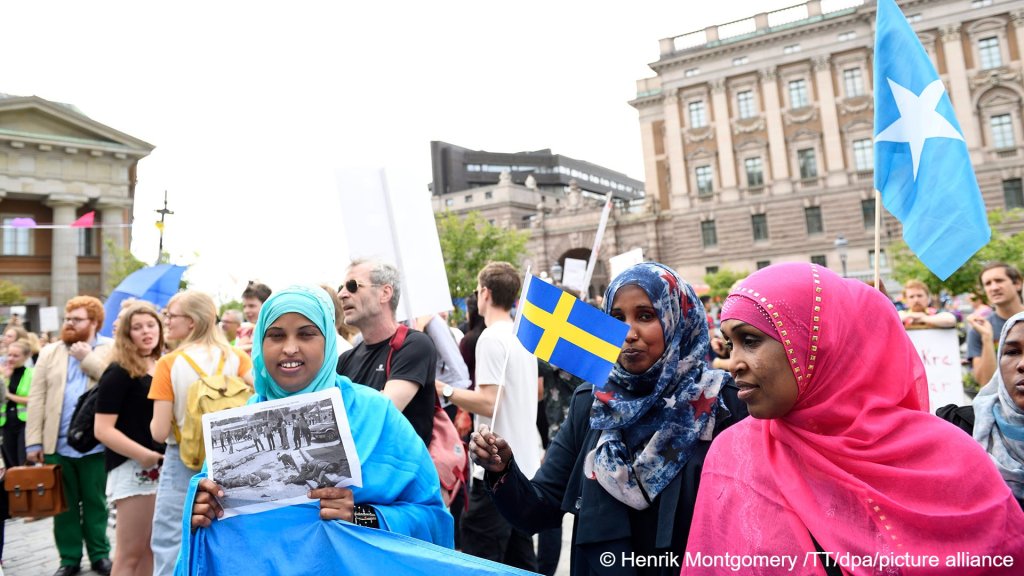The Swedish government plans to cut social benefits for non-European immigrants in the hope of discouraging migrants from coming to Sweden.
Sweden’s coalition government is set to introduce reforms requiring immigrants from countries outside the European Union to learn Swedish and compete for jobs in the country’s highly-skilled labor market.
While the details of the changes are still being worked out, the leaders of the three-party coalition and the far-right Sweden Democrats (SD) have claimed that Sweden has “significant problems” with foreign-born people who are unemployed and live on benefits.
In an opinion piece in the newspaper Dagens Nyheter on Friday (October 20), they said that over the last decade, more than 770,000 people have immigrated to Sweden from countries outside the EU and European Economic Area (EEA).
“Together with an integration policy that has made almost no demands (on immigrants) and provided no incentive to integrate into society, immigration has created a divided Sweden,” they continued.
In the opinion piece in Dagens Nyheter they refered to “segregation, social exclusion, unemployment, poor school results and a lack of common Swedish values.” The piece did not include official data to support its claims, nor provide information on the number of Swedish citizens who live on benefits, Agence France Presse (AFP) reports.
To receive state welfare payments, a non-EU foreigner must currently reside and be expected to reside in Sweden for at least one year.
Paradigm shift in migration policy
Swedish center-right Prime Minister Ulf Kristersson’s minority government came to power just over a year ago with the support of the anti-immigration and populist Sweden Democrats, led by Jimmie Akesson. Since last September it has introduced a number of reforms aimed at reducing the number of migrants coming irregularly in Sweden and expelling rejected asylum seekers.
The changes include proposals to tighten the conditions for citizenship, using DNA analysis to identify migrant individuals, limiting grants of residence permits based on humanitarian grounds, imposing stricter conditions on family reunion visas, and removing the possibility to apply for a work visa following rejection of an asylum application.
The government’s agenda, now strongly aligned with the position of the SD party, continues a shift for Sweden, which was once considered a generous and fair welfare state and which took in more asylum seekers per capita than any other EU country during 2015-2016.

The situation today is markedly different from eight years ago. While there has been a substantial increase in the number of asylum applications in other European countries, Friday’s opinion piece pointed out that applications to Sweden are down by 26% from a year ago.
Migrants held responsible
The change in Sweden coincides with the rise in 2018 of the SD party, which has long highlighted what it argues is a link between violent crime and immigration. Many non-European immigrants in Sweden live in poor neighborhoods outside big cities, where unemployment and crime are high, and where little Swedish is spoken.
As well as blaming Muslim immigrants in particular for crimes related to terrorism, the SD has described immigrants as rapists, murderers, human traffickers, drug smugglers and welfare criminals, says Anita Heber, a criminology expert at Stockholm University.
In 2018, the party expressed concern that the welfare system was “well on the way to falling apart in parallel with (…) increasing immigration…”.
“We can see how newly arrived immigrants are given precedence in the labor market and in housing queues, at the same time as illegal immigrants are given access to a welfare system that is in many ways already under pressure,” the SD stated in Parliament.
Political debates at the time also began to highlight the idea, also a much-discussed topic in Germany, that a generous universal benefit system acts as a magnet to attract migrants.
Tougher conditions
Among the government’s proposed reforms is a move to introduce a ceiling on benefits for non-EU migrants so they cannot receive multiple allowances – such as for children, housing, unemployment, sickness and parental leave. In addition, migrants will have to wait longer in future before qualifying for benefits.
Sweden’s former migration minister and Social Democratic Party spokesperson on immigration, Anders Ygeman, said it was difficult to address the government’s plans before all the details were known. But in a statement provided to AFP, he noted that qualifications were already needed in order to receive certain benefits.
“It is obviously important that we have a functioning integration where new arrivals quickly find work, and we should also have a benefits system that contributes to well-functioning integration,” Ygeman said.
The changes being proposed by the government would only affect migrants from outside the European Economic Area. Other migrants who come from countries in the EU and EEA are covered by Europe-wide rules on freedom of movement.
Source: Info Migrants



